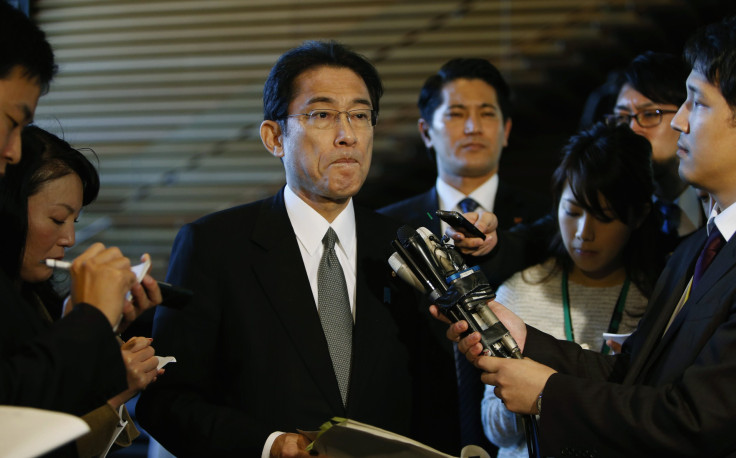Japan Approves 'Non-Military' Aid For Foreign Troops, Revises Country Policy

Japan’s Cabinet approved for the first time Tuesday supplying aid to benefit foreign troops, on the condition that the aid would remain exclusively non-military. But some analysts wondered if the government would be able to truly ensure that any assistance it rendered would remains strictly non-military. “Based on the new framework, we will promote more strategic development assistance and further contribute to the peace, stability and prosperity of the international community,” Foreign Minister Fumio Kishida told reporters following the Cabinet meeting, according to Japan Times.
This is the first revision in nearly 12 years of its Official Development Assistance (ODA) act, which has a long-standing policy that foreign aid should not be used for military purposes. The Cabinet made an addition to allow funds to flow to armed forces overseas for disaster relief, to be approved by vote on a case-by-case basis – a scenario not even possible prior to the revision. “Where military forces or personnel are involved in development assistance for civil or non-military purposes such as disaster relief, each case is studied specifically with a focus on practical significance,” the charter now says.
“The sentence is quite vague. What does ‘practical significance’ point to? What are the criteria for studying each case?” Eiichi Sadamatsu, director general of the Japan NGO Center for International Cooperation, told Japan Times, adding that the lack of criteria in the charter means that the clause can be interpreted in any way. "The government says its aid is only for such purposes as post-disaster rescue. Let's say trucks or helicopters were bought under such programs. The problem is it is impossible to make sure they are used only for such purposes," Yoichi Ishii, professor emeritus at Kanagawa University, told Reuters.
Kishida has repeated that aid will not be used militarily, and has indicated that the charter revision is targeted at the Asian region – particularly Southeast Asia, where China’s naval presence is on the rise, and where Japan has ongoing land disputes with nations in the region. “(Japan) will support comprehensive and sustainable growth for ASEAN as a whole,” said the charter.
The ODA has been Japan’s major tool of diplomacy since the end of the Cold War, according to Asian-focused news site The Diplomat, allowing Japan to participate in the international aid community where it could, since Japan was not allowed to take part militarily due to its pacifist constitution. The ODA’s revision comes on the tail of Japanese Prime Minister Shinzo Abe’s efforts to put more muscle behind Japan’s military and make Japan more of an international player, with the Cabinet unanimously passing an anti-terrorism resolution recently.
Abe has also been trying to push for a constitutional reform that might delimit its self-defense force, currently moored to regional territories, but might end up seeing greater action overseas if Abe’s bid pushes through. The Japanese public, once hesitant to further place the nation in any spotlight that might draw conflict, seems to be rethinking that stance in light of the beheading of civilians Kenji Goto and Haruna Yukawa by the militant group Islamic State in January.
© Copyright IBTimes 2024. All rights reserved.






















